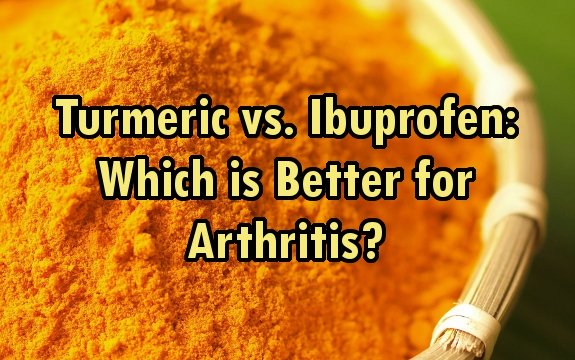Turmeric vs. Ibuprofen: Which is Better for Arthritis?

 Ibuprofen has a corner on the over-the-counter pain market, accounting for one-third of OTC analgesics in the U.S. But this popular pill has serious risks, having been definitively linked to heart disease in a study last year. Fortunately, there are alternatives, and new research suggests one of the best options may be the spice
Ibuprofen has a corner on the over-the-counter pain market, accounting for one-third of OTC analgesics in the U.S. But this popular pill has serious risks, having been definitively linked to heart disease in a study last year. Fortunately, there are alternatives, and new research suggests one of the best options may be the spice
The Food and Drug Administration (FDA) said in a 2002 report, that over 100 billion tablets of ibuprofen had been sold in the U.S. since it became available in 1984. Obviously, that number has likely grown significantly since the report. Then, they estimated ibuprofen users were taking an average of 17.1 pills per month, a significant amount, but understandable for those living in chronic pain.
The most recent research intended to study a group of people with such chronic pain, and the effects of ibuprofen compared with the effects of
Published in the Journal of Clinical Interventions in Aging, the research sought to “determine the efficacy and safety of Curcuma domestica extracts in pain reduction and functional improvement.”
Curcuma domestica is the latin term for
Read: 6 Herbs and Foods for Arthritis
The 367 participants were randomly assigned into two groups—one that would receive 1,200 mg of ibuprofen per day and the other who would receive 1,500 mg of
The researchers report their results as follows:
“The baseline characteristics were no different between groups. The mean of all WOMAC scores at weeks 0, 2, and 4 showed significant improvement when compared with the baseline in both groups. After using the noninferiority test, the mean difference (95% confidence interval) of WOMAC total, WOMAC pain, and WOMAC function scores at week 4 adjusted by values at week 0 of C. domestica extracts were noninferior to those for the ibuprofen group (P=0.010, P=0.018, and P=0.010, respectively), except for the WOMAC stiffness subscale, which showed a trend toward significance (P=0.060). The number of patients who developed AEs was no different between groups. However, the number of events of abdominal pain/discomfort was significantly higher in the ibuprofen group than that in the C. domestica extracts group (P=0.046). “
What does this mean? It means that both
Another study published in the journal Phytotherapy Research in 2012 came to similar conclusions. For this study, researchers found turmeric to be both safe and effective in treating rheumatoid arthritis (RA), a painful inflammatory condition. The results were nothing short of remarkable. The group who received curcumin-only showed the highest percentage of improvement.
Time to have some

I have been using the spice turmeric, daily for over 3 years, and DOES NOT help with my arthritis, I’m always going back to ibuprofen, unfortunately.
Have you looked into Low Dose Naltrexone? Helps MS suffers as well as arthritis.
This article is a bit unclear – the study used an EXTRACT of turmeric, which is CURCUMIN, but it refers to it a few times as turmeric, which is the whole root. I would still continue using turmeric as a food spice, organic only, at the same time as taking curcurmin supplements. In addition, your whole diet needs scrutiny by a ND for inflammatory factors.
If you are going to use OTC analgesics, be sure to NAC as well to protect kidneys and liver.
I’ve used curcumin for some time now for joint pain and it works better for me than ibuprofen with no abdominal that ibuprofen causes me. It works well for me.
Only 2 groups? Should have been at least 3, the 3rd taking a placebo. Shoddy work by the researchers to the point that this study is invalidated.